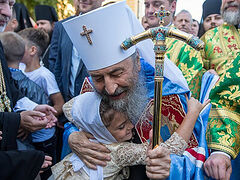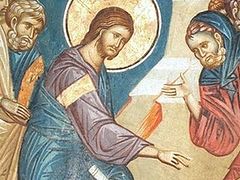 bibleresearchtoday.files.wordpress.com
bibleresearchtoday.files.wordpress.com
And as ye would that men should do to you, do ye also to them likewise. For if ye love them which love you, what thank have ye? for sinners also love those that love them. And if ye do good to them which do good to you, what thank have ye? for sinners also do even the same. And if ye lend to them of whom ye hope to receive, what thank have ye? for sinners also lend to sinners, to receive as much again. But love ye your enemies, and do good, and lend, hoping for nothing again; and your reward shall be great, and ye shall be the children of the Highest: for he is kind unto the unthankful and to the evil. Be ye therefore merciful, as your Father also is merciful (Lk. 6:31-36).
In the name of the Father and of the Son and of the Holy Spirit!
Brothers and sisters! Every word of the Holy Gospel is a Heavenly ray illuminating our lives. But the Gospel that we heard today is of absolutely exceptional importance for a Christian’s salvation.
The Lord said: Love your enemies (Mt. 5:44, Lk. 6:27, 33). These words are the very life of a Christian. If the heart is beating, then the man is alive; if his heart stops, he is no more—he turns into a corpse. A corpse may still maintain a resemblance to a living person for some time, but then it begins to decay and decompose.
Likewise, Christianity without the commandment of love for enemies turns into a corpse. A corpse in a coffin can be decorated with flowers, dressed in fancy clothes; but still, it has no life.
Brothers and sisters! Love for enemies is the key to understanding the mystery of Christianity. It’s the light that illuminates the very depths of the Gospel. Love for enemies is the door to the Holy of Holies of the Christian Church.
The Lord said that upon these two commandments—love for God and love for man—hang the entire Law and all the Prophets (Mt. 22:40). But in this new commandment—love for enemies—is found the spirit of the New Testament. The moral strength of the Gospel is as if concentrated in these words. Love for enemies, like the Cross of the Lord, seemed like madness to the world—a world that worships its own idols and heroes.
There are various idols. Idolatry can be explicit, or it can be secret, unseen. There are terrible idols—the idols of the passions, idols before which human blood is shed; but, brothers and sisters, there are also other idols. These idols have a comely appearance, and I’d even say more—these are those human, earthly deeds and “virtues” that take the place of God in the heart. For example, science becomes an idol for those who believe it can solve all the problems of life, that it will bring man complete happiness. The ancient Pharisees’ idol was the Jewish nation itself, with its customs, language, and history. The idol of some particularly poetic characters can be the beauty of the surrounding world, the beauty of nature, which they worship as God. Therefore, brothers and sisters, there’s a secret idolatry, when earthly values, temporary and conditional, are put on the same level as the Eternal and Divine. But these man-made idols can’t give man true love; they cool his heart, they turn his soul earthward—and such a man cannot, is incapable of loving his enemies.
Many didn’t and don’t understand this commandment and think: “How can this be? Because if you love your enemies, that means not fighting against injustice and evil. But then our enemies will devour and destroy us.” No, brothers and sisters, whoever loves his enemies is protected by the special grace of God. But loving enemies certainly doesn’t mean loving their evil deeds, sins, and transgressions. We can fight with evil but at the same time love the man who commits this evil, and see in him, as in every man, the shining image of God; we can see a priceless diamond, though tossed into the dirt and dust.
The Church of Caucasian Albania,[1] which no longer exists, was once headed by Catholicos Gregoris. He was ordained a bishop in his youth, when he was only seventeen. He was a man of holy life who converted Caucasian Albania (present-day Azerbaijan) to Christianity. When he was twenty-three, his country was invaded by the Huns. He went to their king-ruler and began to preach the Gospel to him. The king of the Huns listened carefully; it seemed he was ready to allow Gregoris to preach among the Huns and was even close to accepting this teaching himself. But when Gregoris started talking about love for enemies, the Hun generals shouted: “King, don’t you see that he’s an infiltrator who’s come to destroy us? If we love our enemies, then we’ll have to throw down our swords, go out to them unarmed, and they will destroy us all. Don’t you see the net he’s luring you into?”
Then the king of the Huns ordered Gregoris to be tied to a wild horse and the horse released into a field… The relics of the saint were buried in Azerbaijan (Albania), in the town of Maraş, where an ancient Christian church—the tomb of the Albanian Catholicoses—still stands.
Some understand the greatness of the commandments of love for enemies and say: “This commandment is beautiful, but do I have it in me to fulfill it? This commandment is like the top of a mountain covered with eternal snow. This peak shines in the sun with ice crystals. It’s like a huge ship surrounded by clouds sailing in the sky, unfurling its white sails; or a cliff rising from the sea. We see how beautiful the peak is, we imagine what a beautiful view we can behold from it, but can we really reach it? After all, the cliffs are sheer and the abysses open up to their dark holes below. Only a few can reach it, while we remain far below. So if we can’t love our enemies, if we can’t keep this commandment, will we really perish? Then what was this life given to us for?”
Brothers and sisters, remember that the Gospel commandments are both heavy and light at the same time. They’re light because our soul is Christian by nature; light because we have not only the ability, but the need to love one another. They’re heavy because our pride tends to hate. Humility is like an eagle’s wings that can lift the soul to the height of love. But our pride is like terrible chains that bind us spiritually; it’s a tombstone that weighs on our heart.
Brothers and sisters! How can we keep this commandment of love for enemies? We must acquire those virtues that lead a man to love. We must pray for the Lord to grant us love for enemies—it’s a state of blessedness, it’s a gift of the Holy Spirit given to those who are worthy and prepared. The Holy Fathers say that three virtues lead to love: humility, mercy, and temperance.
The first degree of humility is to see your own sins, innumerable as the sand of the sea. One day Patriarch Theophilos visited the ascetics of the Mountain of Nitria, where there were many monasteries, and asked the oldest monk-abbot: “What’s the best thing you’ve found on the spiritual path?” And he answered: “The best thing is to always blame and reprove only yourself in all things!” Patriarch Theophilos said: “This is not only the best way—it’s the only way to God!”
The second degree is non-condemnation and love of obedience. St. Anthony, the greatest of monks, consulted with his disciples when necessary, receiving their words as the voice of God.
The next degree of humility is to thank the Lord for all our sorrows and rejoice in insults as worldly people rejoice in glory and honor.
The second virtue that leads to love is mercy. Mercy is sometimes rewarded here on earth, but it’s much more important that secret mercy for others should turn into love for God; that love for men turn into love for one’s enemies. For, brothers and sisters, the highest mercy is a secret, hidden mercy.
Then, temperance. The Holy Fathers say that with the intemperate, the flesh as if devours the spirit. The soul of such a man becomes corpulent, crass, incapable of spiritual experiences. It becomes like flesh and earth.
In addition, when hatred and malice towards a man boils up in our heart, we have to remember that we’re all mortal. The hour will come when both we and our enemy will lie together in the same ground. And then his tongue, with which he spoke evil, insulting words, will be eaten by worms. His brain will turn into serous fluid and will flow out of his nostrils and ears. His mouth will be filled with dirt. His hand, which perhaps was once raised against us, will lie motionless in the ground, like a rock. The eyes that looked at us arrogantly and proudly will fade and fall out of their sockets. And our souls will stand together before the throne of God in awe, awaiting the Judgment…
Brothers and sisters, no matter how much an enemy is hateful to us, we still wouldn’t want him to be thrown into a fire, to be burned alive. And if we see the yawning abyss of terrible hell below us, we’ll be ready to forgive a man thousands and thousands of offenses, so he doesn’t fall into that terrible Gehenna, which causes even the demons themselves to quake and tremble.
So, remember the hour of death; remember that everything here is transitory and trivial. When malice boils up in your heart, remember that your enemy is also the image and likeness of God. How can we deprive him of the image of God, His eternal, shining beauty? Respect the image of God in him, even if he’s the worst criminal. Then remember that every man has a guardian angel, and if you forgive your enemy, his angel rejoices and prays for you, and together with him, the entire Heavenly Host.
In the book of Revelation we find these words: And she being with child cried, travailing in birth, and pained to be delivered (Rev. 12:2). Several commentators say this is the Mother of God, and her torments are those that she experienced at the Cross instead of the torments of childbirth. But there’s also another interpretation, that the woman “being with child” is the holy Church, and the child is every Christian. The Church gives birth to him unto spiritual life in terrible agony, suffering for his every sin.
Yes, indeed, the Church suffers as a mother from our sins, from our enmity towards one another, to its beloved children, and rejoices in our salvation. Brothers and sisters, also remember that every man is a great mystery, and there is goodness in our enemy that we don’t see. Further, when hostility, malice, and thirst for revenge lurk in our hearts like a snake, then remember that when you forgive someone, then the Lord forgives you. Also remember that our enemies are our first benefactors. After all, in reproving, insulting, and offending us, they clean the pus from our sores and wounds. If we understood this, we’d be more grateful to our enemies than to our friends.
We have to pray for our enemies. St. Nilus of Sinai says: “Before every prayer, first pray from your heart for those who have offended you, and then ask what you will from God. God will hear you!”
And most importantly, remember the love of Jesus Christ for man. St. John Chrysostom says: “The Lord loves man more than the whole visible world!” Imagine Heaven and earth, imagine the beauty of the earth: a carpet of flowers and herbs, streams and mountain rivers; imagine the gold of the sun, the stars that shine like heavenly lamps. Brothers and sisters, the world is nothing before God in comparison with one human soul! Therefore, the soul of your enemy is more valuable than the whole of the visible world! Also remember that the Lord, according to St. John Chrysostom, loves one human soul as much as He loves mankind as a whole.
That means the Lord loves our enemy with the same might with which He loves all of mankind, including the righteous and the saints.
Remember that the Lord came to earth and was crucified for every man, and that means He came and was crucified for our enemy as well. And be horrified by this power of God’s love and the baseness with which we consider a man—the image and likeness of God—our enemy and are ready to send him thousands of curses!
Brothers and sisters, the word “forgive” is a great mystery. When we forgive someone, we feel peace and happiness in our souls. There is no greater happiness on earth than to forgive your abuser. And the more unjust the offense inflicted upon us, the more cruel, and the more sincere and deep our forgiveness, the higher and brighter this joy is!
Brothers and sisters! Heaven and earth cannot contain God, but they contain His little human heart. If we love our enemies, then our heart becomes a temple and the Lord dwells in it. If we exclude even one person from our love, then the Lord leaves us, and with Him—joy and light!
Amen.




